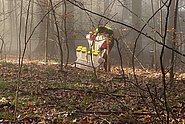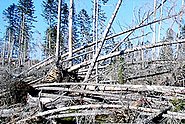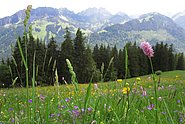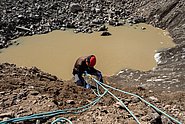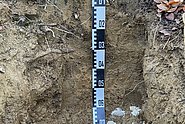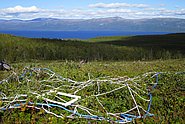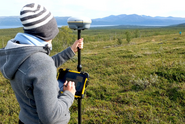Soils play an important role in the global carbon cycle, as they store large amounts of carbon and large amounts of carbon dioxide (CO2) are exchanged between soils and the atmosphere. We are studying the effects of changes in climate and land use on soil carbon storage.
Contents ¶
In Switzerland, soils store about 80% of the terrestrial carbon and 7-8 times as much as the atmosphere as CO2. Temperature, moisture and litter inputs exert a main control on soil carbon cycling. As a consequence, changes in climate and land use affect C fluxes between soils, vegetation, and the atmosphere. In particular, forest disturbances by storms, insects or intense forest exploitation can induce carbon losses from soils.
Key objectives ¶
- How much and in which form is carbon stored in Swiss forest soils?
- What are the effects of changes of climate warming, drought and disturbances?
- What are the effects of climate change induced vegetation shift on soil carbon?
- How does afforestation and management impact soil carbon?
- What are the effects of permafrost on the CO2 balance of alpine soils?
Approaches ¶
- Field and lab experiments: Response of C fluxes and pools to increased soil temperatures, drought, elevated CO2, and N deposition.
- Stable isotopes and radiocarbon: tracing carbon in soil pools and fluxes.
- Monitoring of fluxes: measuring soil CO2 fluxes and DOC leaching in forests.
- Carbon inventory: estimates of C stocks of Swiss forest soils.




Contacts ¶
Publications ¶
Guidi C., Frey B., Brunner I., Meusburger K., Vogel M.E., Chen X., … Hagedorn F. (2022) Soil fauna drives vertical redistribution of soil organic carbon in a long‐term irrigated dry pine forest. Glob. Chang. Biol. 28(9), 3145-3160. https://doi.org/10.1111/gcb.16122 Institutional Repository DORA
Hagedorn F., Gavazov K., Alexander J.M. (2019) Above- and belowground linkages shape responses of mountain vegetation to climate change. Science. 365(6458), 1119-1123. https://doi.org/10.1126/science.aax4737 Institutional Repository DORA
Hagedorn F., Krause H.M., Studer M., Schellenberger A., Gattinger A. (2018) Boden und Umwelt: organische Bodensubstanz, Treibhausgasemissionen und physikalische Belastung von Schweizer Böden. Thematische Synthese TS2 des Nationalen Forschungsprogramms «Nachhaltige Nutzung der Ressource Boden» (NFP 68): Vol. 2. Bern: Schweizerischer Nationalfonds zur Förderung der wissenschaftlichen Forschung. 93 p. Institutional Repository DORA
Gosheva S., Walthert L., Niklaus P.A., Zimmermann S., Gimmi U., Hagedorn F. (2017) Reconstruction of historic forest cover changes indicates minor effects on carbon stocks in Swiss forest soils. Ecosystems. 20(8), 1512-1528. https://doi.org/10.1007/s10021-017-0129-9 Institutional Repository DORA
Hiltbrunner D., Zimmermann S., Hagedorn F. (2013) Afforestation with Norway spruce on a subalpine pasture alters carbon dynamics but only moderately affects soil carbon storage. Biogeochemistry. 115(1-3), 251-266. https://doi.org/10.1007/s10533-013-9832-6 Institutional Repository DORA



